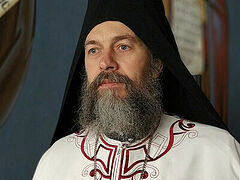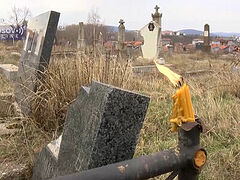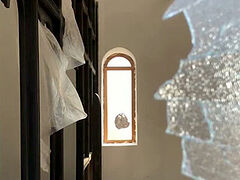 Archimandrite Damjan (Cvetkovic) —How, according to your observations, do Serbian youth feel about the Church? Do young people have the desire to be in the Church?
Archimandrite Damjan (Cvetkovic) —How, according to your observations, do Serbian youth feel about the Church? Do young people have the desire to be in the Church?
—I can’t give you exact figures. But when I serve, I see a large number of young people in churches. From conversations with my priest friends I know that the number of believers has increased, including young people. But I can’t provide any numbers because I am not a parish priest. And I’m not sure whether a rigorous calculation with tenths and hundredths of a percent is needed in such cases.
—What is the main thing in Christianity for Serbia? Is Orthodoxy more of a tradition? Are the “Krsna Slava” [the celebration of the family patron-saint’s day, which every family chooses for itself.—Trans.], fasting before Communion, candles in front of icons, fish and wine at “Badnji dan” [the Serbian name for Christmas Eve during the day.—Trans.] some kind of folk tradition or faith and life?
—This is a difficult question. I’m not sure I can give an exhaustive answer. I’m unable to single out any particular virtue of the Serbian people... Another thing is that since recently I have been feeling ever keenly the conditions in which the Serbs have been living for 1,000 years now. I wouldn’t call them the most favorable ones, as you can understand: Orthodox Serbs have to live alongside Catholics or Muslims. It can’t be said that our coexistence is always quiet, peaceful and friendly—I think the events of the twentieth century and the beginning of the current century need no comments. The same is true of past centuries. And yet, the Serbs preserve Orthodoxy despite the Jasenovac concentration camp, the “final solution of the Kosovo and Metohija issue”, the Ottoman yoke, and so on. And thank God! 400 years under the Ottomans (officially it was called the Ottoman Empire); then there was practically no Serbia at all, and we were in total slavery and humiliating submission. But our ancestors survived with God’s help. And now we stand by the grace of Christ. I don’t know which virtue is the most important, but there is something in an Orthodox Serb if he has managed to preserve Orthodoxy throughout all these centuries.
I really like the beautiful word that St. Justin (Popovic) used to call sincere Serbian Christians, which translates as “spiritual heirs of St. Sava”. Only by keeping the precepts of St. Sava and following them can we say that we are Serbs. Without St. Sava we are not Serbia. So, it’s impossible for me to separate Orthodoxy from Serbianism. This is not ethnophyletism, as you must understand. The point is that sometimes (and, in our case, very often) the observance of Orthodox traditions can be equal to the preservation of Orthodoxy. When under pain of death they tried to force a Serb to abandon the celebration of “Krsna Slava”, the problem was not in the festival; the abandonment of “Krsna Slava” was tantamount to the renunciation of Orthodoxy. Let me remind you of the words of the Ustashe executioners addressed to the condemned men forcibly converted to Catholicism in Bosnia (even though they had promised to save their lives if they converted to Catholicism): “We don’t need your bodies—we need your souls.” So in this case I would be extremely careful with the reckless abandonment of traditions. They can have great spiritual significance. But you need to live in Serbia for some time in order to feel that not everything is as simple as it seems to be.
This is not folklore, not just tradition. This is an essential part of Serbian Orthodoxy. I believe that Serbia has always striven to preserve and, as far as possible, observe the Orthodox faith. In turn, Orthodoxy preserved the Serbian identity. That is, if the Serbs were not Orthodox, I am deeply convinced that there would be no more Serbia as a point on the map. It may seem that lighting candles is just a custom, right? There is nothing doctrinal or dogmatic here. But I know and see every day that if a person lights a candle according to the tradition that he has inherited from his father, mother and grandmother, he experiences it (to the extent of his spiritual development) as a conversation with and a sacrifice directly to God. It depends on a person, moment, feeling, mood and purity of his conscience, but I would not abandon tradition so easily.
—Kosovo and Metohija is the bleeding wound of the Serbian Church. Why is this region so important for Orthodox Serbia?
—It seems to me that nothing can be compared to Kosovo because this is the most important part, the soul of the Serbian people and Church. I will say without false modesty: This is not only my personal opinion, but the absolute conviction of our entire Church and Orthodox people, the Patriarch, and the bishops. Serbia is inseparable from Kosovo—perhaps this is one of the few questions the answer to which is accepted unanimously by all Orthodox Christians in the country—discussions are inappropriate and even impossible here. This is not a “point of view”—this is a mood of the heart, a national conviction, a sentiment. Kosovo is our heart and never under any circumstances will we betray our Kosovo. It is simply impossible and absolutely out of question for us.
—It is obviously not just geography. We have a lot of land in Russia—why not sacrifice some 100 hectares? Our state wouldn’t become poorer, so there would be no problem. Why don’t you sacrifice Kosovo? The entire “civilized world” and dear Albanian neighbors will pat you on the back with satisfaction.
—Forgive my laughter. It isn’t about hectares, land, or material wealth. It's about the being, the essence of the Serbian people. This is not only our history and tradition—this is the most important part of our existence. And we are not talking about territory: we are talking about the most important value of the Serbian nation. Without Kosovo we don’t exist as a nation, as a people. This is a deep feeling—and not only my personal one.
—As far as I remember, Patriarch Pavle literally shouted: “If a Serbian woman has five abortions, and an Albanian woman gives birth to five children, apparently God has left this land for the people who deserve it.” Isn’t it a parallel with the Old Testament, with the Hebrews losing their land because of their sins?
—Yes, absolutely true. Only by repentance can one hope for an improvement in his life—this is law. By the way, it is in Kosovo that Serbian women give birth to more children now. I read the statistics a few days ago, and although I can’t repeat it now, I was glad that several thousand Serbian children were born in Kosovo last year. That is, the will to live among the Serbs in Kosovo and Metohija has not been destroyed, thank God. Of course, the problem of abortion has been a universal and very serious one in the world. What can we do here? Only one thing: to not lose heart, but help people to be closer to Christ. I don’t think there is anything else we can do. The Serbian Church, bishops and priests, following the example of Patriarch Pavle, do this to the best of their abilities: they console and support the Orthodox of Kosovo and Metohija.
—As I read and listen to news from the cradle of Serbian Orthodoxy, I understand that Christians there are having a hard time. In just two months of this year there have been many more attacks on Serbs and churches than in the past.
—Is that really surprising? In my opinion, everything is logical, although frightening—the same gates of hell have been trying to kill God’s Church. Tell me, have they ever succeeded? So, let’s believe Christ Who promised us to keep His Church. One thing is required of us: to be in this Church. So,we don’t despair.
P.S. Dear brothers and sisters, we continue to help Kosovo Serbs, churches and monasteries. If you have the opportunity and desire to help, donations can be transferred to the Sberbank card number: 5469017709235086 (recipient: Петр Михайлович Д. / Petr Mikhailovich D.);
to the Sberbank MIR card: 2202201429782747 (recipient: Петр Михайлович Д. / Petr Mikhailovich D.);
via PayPal: https://www.paypal.com/paypalme/petrusdavidov
The note, “Aid to Kosovo”, is required.



